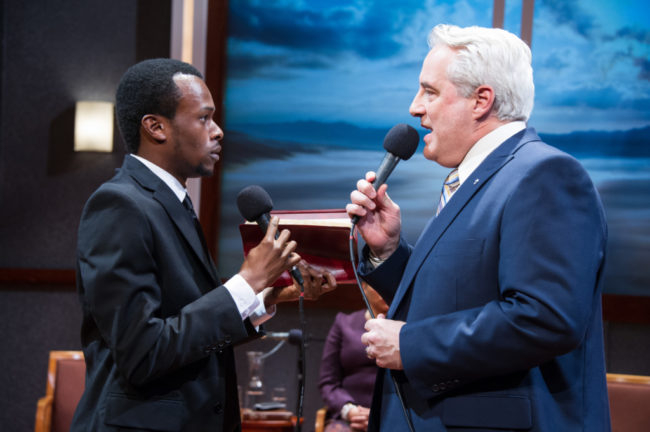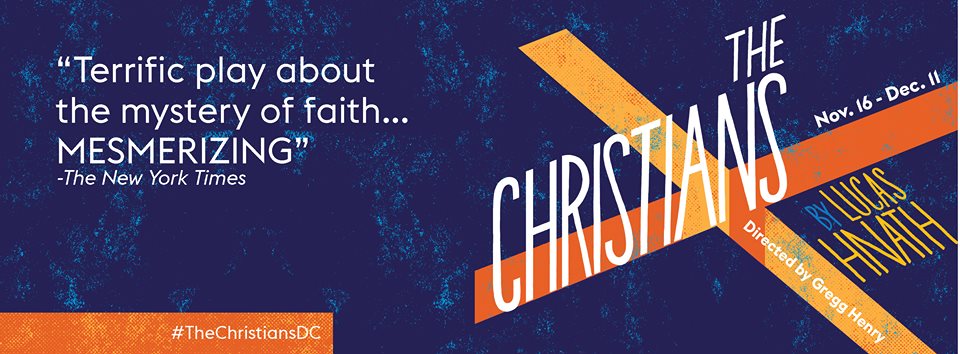Brothers and Sisters of Washington DC, let us pray. Bow your heads, whether your Jewish, Christian, practicing, non-practicing, believing, non-believing; Lucas Hnath’s The Christians has got you covered anyway you look at it. It’s so simple, you might call it grace. This powerfully evocative drama, Directed by Gregg Henry, is opening the doors and challenging the community of Theater J and theatergoers across the nation’s capital to broaden their viewpoint on religion and salvation. A stunning conflict of faith and belief comes to raw, emotional light under Henry’s direction and draws forth a conversation that is in desperate need of having when it comes to faith. What happens when the core of your beliefs are shaken through to rock bottom? Do you stay? Do you go? Where are you now and where do you go next? This striking piece of theatre speaks volumes to the current political situation of the nation, going far above and beyond a crisis of religious faith. Hnath’s work uses religion as a framing lens to focus the broader topic of belief among the human race, which effectively touches the heart in the visionary hands of Director Gregg Henry.

Partnering with area churches and community organizations throughout the run of The Christians at Theatre J, each performance of the play features a different choir to aid in and authenticate the church experience of the production. At this performance, The Refreshing Spring Church of God in Christ’s James E. Jordan Jr. Choir, led by Robert Ford, was the voice of worship and praise. There is something untouchably soulful and indescribably pure about the way this particularly choir sings the gospel. If God in any capacity exists in your life it can be said that their singing is channeling the messages of faith, hope, and love, directly from the divine up above through their voices and into your ears. Filled with vibrant spirituality and lively enthusiasm, as well as somber reverence when the attitude of the song shifts, The Refreshing Spring Church of God in Christ’s James E. Jordan Jr. Choir, led by Robert Ford, is a remarkable addition to the evening’s performance.
The irony that a great many individuals from varying walks of faith treat theatre like their church is not lost on the audience as they enter the Aaron & Cecile Goldman Theater inside the Washington DCJCC. Scenic and Projection Designer Jonathan Dahm Robertson has set the stage in a manner that creates an evangelical atmosphere. The double pulpit, the trio of enormous hanging crosses, split by the projection screen, are all hallmarks of a church designed to preach service to the thousands. Robertson’s specific layout and subsequent live-feed projection of Pastor Paul fortifies the notion that theatergoers are attending a church service. Furthering still the immersive experience, Robertson projects hymn lyrics and bible verses onto the screen throughout the performance as it suits the sermon and overall progression of the service within the church.

Though interior lighting is often an easily dismissed design element in straight forward dramatic productions such as this one, Lighting Designer Kyle Grant pays particular attention to the way light impacts the reality of the play. Leaving the house lights up during the ‘service’ segment of the play allows for the audience to feel wholly inclusive in the experience. Using darkness and shadow, albeit subtly, to play upon the struggles in faith are another praiseworthy example of Grant’s design work. These carefully nuanced decisions, along with Sound Designer Patrick Calhoun’s occasional use of the echo-chamber microphone effect for Pastor Paul, wholly authenticate the church vibe consistently throughout the production.
Without delving into the specifics of the play itself, the topic of discussion that Lucas Hnath brings to the table for debate is a potent one. Faith, be it religious or otherwise, is at the best of times a mystery to a great many individuals and even those who are unwavering in their beliefs can sometimes find themselves challenged at their core. The way Director Gregg Henry approaches the piece brings a reverent and yet visceral focus to Hnath’s work, delving deeply into the subject matter and how it applies not only in a religious context but in a universal context as well. The conversation that Henry is starting with the audience by way of this production is an intense one; this is a conversation that poses questions many are uncomfortable thinking about let alone answering and in its most basic sense this is what theatre is primed to do.

The cast is small, and although Elder Jay (Michael Willis) and Jenny (Annie Grier) are but momentary participants in the bigger scheme of things, their carefully honed characters are constructed with a rich depth. Willis, who is the voice of moral support from the council of elders when it comes to Pastor Paul’s decision to shift the church in a new direction, is firm but kind and all of the things one expects an elder to be. Grier’s performance as Jenny, a member of the congregation, is deeply stirring and harrowing on an emotional level that is beyond compare. Her gripping exchange with Pastor Paul is a cataclysmic turning point for the play’s rising tension, which in Grier’s skillful hands is delivered with swift justice.
Finding one’s own voice is tricky enough in a world defined by faith, even more so when your role is that of the pastor’s wife, as is the case of Elizabeth (Caroline Stefanie Clay.) But that challenge becomes exponentially more difficult when the views of the Pastor’s wife differ from that of the Pastor. There is something undeniably convivial about the way Clay approaches the character of Elizabeth. There is a brightness to her emotional depth, which allows the audience to both sympathize and empathize with the character, while following her character’s journey in a non-effusive or derailing fashion. The exchanges shared between Clay’s character and Pastor Paul are jarringly profound and spark true flames of conflict between spouses when it comes to a difference in their core beliefs.
Associate Pastor Joshua (Justin Weaks) holds his own against the powerfully charismatic Pastor Paul (Michael Russotto.) Though their interactions are few, they are mighty, possessed of a passionate embrace regarding their unyielding beliefs. This difference of heart drives the insurmountable tension between them, and by proxy the momentum of the show. Weaks is emotionally raw, investing himself fully in the role both physically and verbally. The emotional expressivity which Weaks displays is impressive, particularly when it comes to exiting the stage through the audience in the earlier moments of the show.

Michael Russotto is hypnotic in his pastoral pontifications, drawing the audience in as true members of the congregation. There is a narrative element to Russotto’s portrayal that guides the story along from an external perspective while maintaining an internal hold on the action and interpretation of the experience. The earnest nature which Russotto expresses when accepting his confusion and vulnerability are striking in a profoundly unsettling way, making his work with Pastor Paul that much more intense. A remarkable performance given by Russotto carries a great deal of the show’s burden as well as the show’s relief when the conclusion finally arrives.
Faith is a struggle for everyone, regardless of your religious affiliation. The Christians brings home this very human concept to peoples of all walks of faith; it serves as an unyielding reminder that at our core we are all human, and is a play worth its weight in gold to see at this moment in our history.
Running Time: Approximately 90 minutes no intermission
The Christians plays through December 11, 2016 at Theater J in residence at the Washington DCJCC’s Aaron & Cecile Goldman Theater— 1529 16th Street NW in Washington, DC. For tickets call the box office at (800) 494-8497 or purchase them online.

